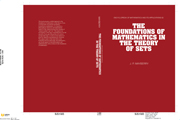Book contents
4 - The Principal Axioms and Definitions of Set Theory
from Part Two - Basic Set Theory
Published online by Cambridge University Press: 05 March 2012
Summary
The Axiom of Comprehension and Russell's Theorem
In this chapter I shall present the principal axioms of set theory. As I have already explained (Section 3.5), all these axioms can be construed as embodying claims to the effect that certain species are finite (in the appropriate sense), and therefore form sets: in brief, these axioms can be construed as principles of finiteness.
The finiteness principles that are embodied in these axioms can all be formulated in the following general way:
Given certain objects and/or first level global functions (prepositional or ordinary), such-and-such a species of objects (the membership condition for which is specified unamb iguously in terms of the given objects and global functions) is finite, and therefore forms a set.
But this is not the form the axioms proper actually take. In each case the set whose existence is claimed is regarded as the value of a certain global function for the given objects and global functions as arguments. The defining condition for the species whose finitude is asserted by the axiom, albeit indirectly, provides necessary and sufficient conditions for membership in the set that is the value of the global function for those arguments. In laying down these axioms, I shall, in each case, introduce a new symbol,a global function constant, of the appropriate level, to represent the global function whose values are specified by the axiom.
Information
- Type
- Chapter
- Information
- The Foundations of Mathematics in the Theory of Sets , pp. 111 - 150Publisher: Cambridge University PressPrint publication year: 2001
